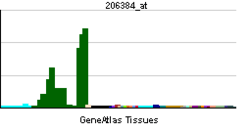CACNG3
| View/Edit Human | View/Edit Mouse |
Voltage-dependent calcium channel gamma-3 subunit is a protein that in humans is encoded by the CACNG3 gene.[3][4][5]
L-type calcium channels are composed of five subunits. The protein encoded by this gene represents one of these subunits, gamma, and is one of several gamma subunit proteins. It is an integral membrane protein that is thought to stabilize the calcium channel in an inactive (closed) state. This protein is similar to the mouse stargazin protein, mutations in which have been associated with absence seizures, also known as petit-mal or spike-wave seizures. This gene is a member of the neuronal calcium channel gamma subunit gene subfamily of the PMP-22/EMP/MP20 family. This gene is a candidate gene for a familial infantile convulsive disorder with paroxysomal choreoathetosis.[5]
See also
References
- ↑ "Human PubMed Reference:".
- ↑ "Mouse PubMed Reference:".
- ↑ Black JL 3rd, Lennon VA (May 1999). "Identification and cloning of putative human neuronal voltage-gated calcium channel gamma-2 and gamma-3 subunits: neurologic implications". Mayo Clin Proc. 74 (4): 357–61. doi:10.4065/74.4.357. PMID 10221464.
- ↑ Loftus BJ, Kim UJ, Sneddon VP, Kalush F, Brandon R, Fuhrmann J, Mason T, Crosby ML, Barnstead M, Cronin L, Deslattes Mays A, Cao Y, Xu RX, Kang HL, Mitchell S, Eichler EE, Harris PC, Venter JC, Adams MD (Nov 1999). "Genome duplications and other features in 12 Mb of DNA sequence from human chromosome 16p and 16q". Genomics. 60 (3): 295–308. doi:10.1006/geno.1999.5927. PMID 10493829.
- 1 2 "Entrez Gene: CACNG3 calcium channel, voltage-dependent, gamma subunit 3".
Further reading
- Powers PA, Liu S, Hogan K, Gregg RG (1993). "Molecular characterization of the gene encoding the gamma subunit of the human skeletal muscle 1,4-dihydropyridine-sensitive Ca2+ channel (CACNLG), cDNA sequence, gene structure, and chromosomal location". J. Biol. Chem. 268 (13): 9275–9. PMID 8387489.
- Burgess DL, Davis CF, Gefrides LA, Noebels JL (2000). "Identification of three novel Ca(2+) channel gamma subunit genes reveals molecular diversification by tandem and chromosome duplication". Genome Res. 9 (12): 1204–13. doi:10.1101/gr.9.12.1204. PMC 311002
 . PMID 10613843.
. PMID 10613843. - Burgess DL, Gefrides LA, Foreman PJ, Noebels JL (2001). "A cluster of three novel Ca2+ channel gamma subunit genes on chromosome 19q13.4: evolution and expression profile of the gamma subunit gene family". Genomics. 71 (3): 339–50. doi:10.1006/geno.2000.6440. PMID 11170751.
- Strausberg RL, Feingold EA, Grouse LH, et al. (2003). "Generation and initial analysis of more than 15,000 full-length human and mouse cDNA sequences". Proc. Natl. Acad. Sci. U.S.A. 99 (26): 16899–903. doi:10.1073/pnas.242603899. PMC 139241
 . PMID 12477932.
. PMID 12477932. - Moss FJ, Dolphin AC, Clare JJ (2004). "Human neuronal stargazin-like proteins, gamma2, gamma3 and gamma4; an investigation of their specific localization in human brain and their influence on CaV2.1 voltage-dependent calcium channels expressed in Xenopus oocytes". BMC neuroscience. 4: 23. doi:10.1186/1471-2202-4-23. PMC 270087
 . PMID 14505496.
. PMID 14505496. - Ota T, Suzuki Y, Nishikawa T, et al. (2004). "Complete sequencing and characterization of 21,243 full-length human cDNAs". Nat. Genet. 36 (1): 40–5. doi:10.1038/ng1285. PMID 14702039.
- Gerhard DS, Wagner L, Feingold EA, et al. (2004). "The status, quality, and expansion of the NIH full-length cDNA project: the Mammalian Gene Collection (MGC)". Genome Res. 14 (10B): 2121–7. doi:10.1101/gr.2596504. PMC 528928
 . PMID 15489334.
. PMID 15489334. - Everett KV, Chioza B, Aicardi J, et al. (2007). "Linkage and association analysis of CACNG3 in childhood absence epilepsy". Eur. J. Hum. Genet. 15 (4): 463–72. doi:10.1038/sj.ejhg.5201783. PMC 2556708
 . PMID 17264864.
. PMID 17264864.
External links
- CACNG3 protein, human at the US National Library of Medicine Medical Subject Headings (MeSH)
- CACNG3 human gene location in the UCSC Genome Browser.
- CACNG3 human gene details in the UCSC Genome Browser.
This article incorporates text from the United States National Library of Medicine, which is in the public domain.
